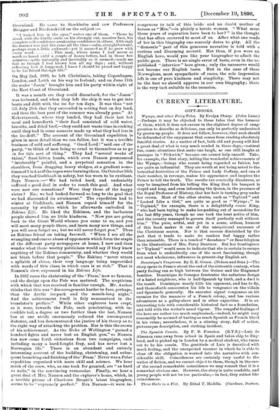CURRENT LITERATURE.
GIFT-BOOKS.
Wymps, and other Fairy Tales. By Evelyn Sharp. (John Lane.) —Perhaps it may be objected to these tales that the humour of them, which it does not savour in the slightest degree of exag-
geration to describe as delicious, can only be perfectly understood by grown-up people. It does not follow, however, that such should be defrauded of the enjoyment that comes from reading absolutely fanciful stories. As a matter of fact, both old and young will find a great deal of what is very much needed in these days,—natural fun, comic situations that make one laugh, as one still laughs at passages in "Pickwick," because one cannot help oneself. Take, for example, the first story, telling the wonderful achievements of the Wymps,—beings who resent being regarded as fairies, but are quite as influential. They are wroth at not being asked to the betrothal festivities of the Prince and Lady Daffany, and one of their number, in revenge, makes his appearance and inspires the Prince to tell the truth. The results are comically disastrous, as may be imagined from his telling the King that his banquet is stupid and long, and even informing the Queen, in the presence of the Royal Professor of History, that her hair is turning grey under her crown. Most of the other stories, such as "Toyland " and "Looked Like a Girl," are quite as good as " Wymps ; " in " Toyland," for example, there is a delightfully comic King, "who had been trying to make ice-pudding out of moonshine for the last fifty years, though no one took the least notice of him, and the country managed to govern itself perfectly well without him." The pure, artful, and yet in a sense, artless, humour of this book makes it one of the unequivocal successes of the Christmas season. Nor is that success diminished by the fact that it tends to make its readers feel happy rather than miserable. There is a touch of " decadence " or Beardsleyism in the illustrations of Mrs. Percy Dearmer. But her frontispiece to " Toyland " would seem to indicate that she is certain to escape from what is undoubtedly one of the most fascinating, though not most wholesome, influences in present-day English art.










































 Previous page
Previous page